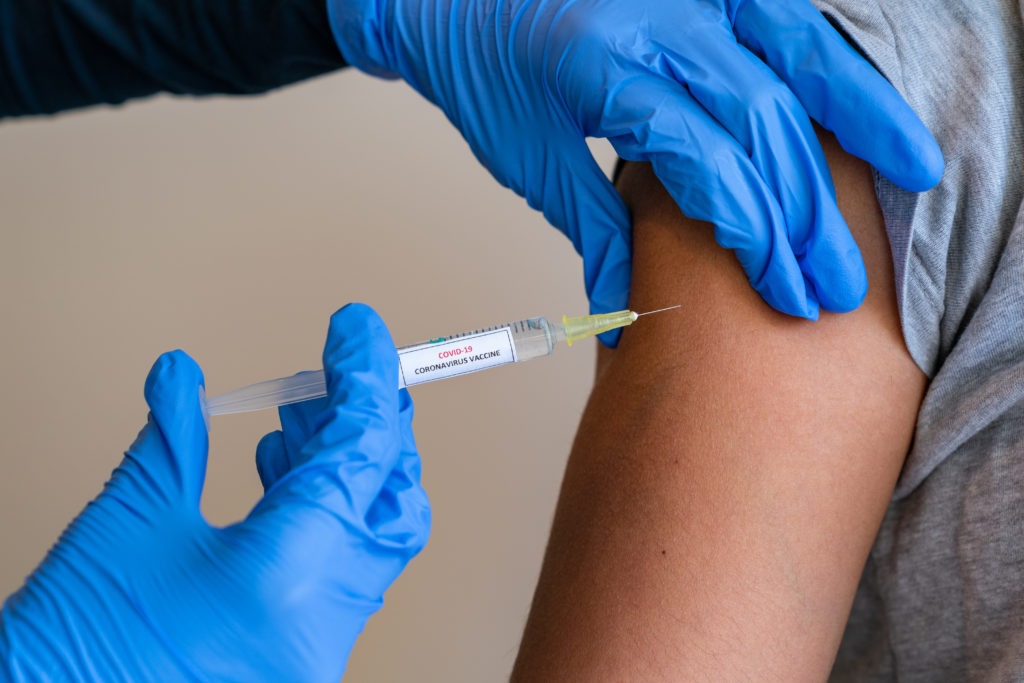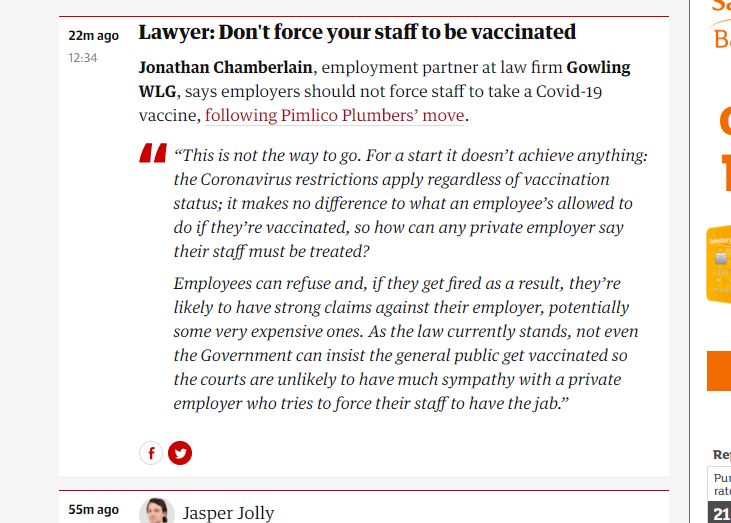
Right now, unless you run a care-home or you’re the NHS, no. In a few months, maybe. Next question please.
Sorry. Endless lockdown, endless January are getting to me. And I thought I’d knocked this one on the head: see below and also here.

However, it appears some people are Not Listening. A survey of 750 executives, conducted by HR software company HRLocker and reported on ‘The Global Recruiter’ apparently found almost a quarter (23 per cent) of employers are planning to mandate vaccination for their staff
To be fair to those couple of hundred executives, whilst what I’ve said is absolutely correct now, the position may change over time for some employers and employees. Here then are my less soundbitey, lockdown-stressed thoughts.
We will start from the position that you do not have to be one of these Covid- denying, soi-disant ‘libertarians’ to believe that no-one should be allowed to stick a needle in you without your freely-given consent. The Government has assumed battalions of extraordinary powers to deal with the pandemic, but none of these rules and regulations permit even the NHS to vaccinate someone against their will.
It is not to say that, for the purposes of the School Debating Club, there are no circumstances in which mandatory vaccinations might be necessary but it is striking that even at this stage in the worst global pandemic in 100 years the Government does not yet think it essential to have this power, even whilst making a criminal offence to visit your grandparents.
That said, it is not unusual for Governments to use the law to oblige employers to bring about the social change they want to see. The bulk of the responsibilities imposed by the equality legislation, for example, falls on employers: there are no general duties of anti-racism or anti-sexism falling on the population as a whole.
Why then should an employer not be able to take what it sees as reasonable steps to protect its staff and customers? A construction company can fire you for not wearing a hard hat: why cannot a supermarket sack you for not having the jab?
Because it is not a true comparison, that is why.
Having the jab does not necessarily protect colleagues or customers because those who have had it may still transmit the disease. In this context, any benefit from you having had the vaccine goes not to other people but your employer. You are unlikely, one hopes, to be off sick with Covid-19 if you have been vaccinated.

However, why should your employer be able to require you to have a needle stuck into you on pain of dismissal just because it helps their absence management? There are lots of other steps they can take to keep you safe, such as distancing and providing PPE, without having to pierce your skin. For those with the necessary qualifying service, could it be said to be within the range of reasonable responses to sack you in these circumstances? Roll-out of the vaccine, whilst progressing very well, is not uniform. Could it be fair to threaten dismissal when you cannot be certain that your staff have all had access to the shots?
Moreover, unfair dismissal is not the only employment protection right about which employers should be concerned. As an employee, you might believe that certain age groups, or people at risk, or people in front line occupations should be vaccinated before you. You might refuse the vaccine not because you are concerned for yourself but for those who you think should be in the queue ahead of you. As a lawyer, essential and valuable though I no doubt am, I think that teachers should have the jab before me. Returning readers of this blog may recall my wife is a teacher and I am in no doubt as to our relative worth, in current times if not generally.
Query if believing one should not have the vaccine until others perhaps more deserving have had it is a philosophical belief protected in law. I think the position is at least arguable, indeed strongly arguable at the moment. The test is
- the belief must be genuinely held;
- it must be a belief and not an opinion or viewpoint based on the present state of information available;
- it must be a belief as to a weighty and substantial aspect of human life and behaviour;
- it must attain a certain level of cogency, seriousness, cohesion and importance;
- it must be worthy of respect in a democratic society, be not incompatible with human dignity and not conflict with the fundamental rights of others.
The first two and the last limbs can be easily satisfied here, but the third (It must be a belief as to a weighty and substantial aspect of human life and behaviour) and fourth (It must attain a certain level of cogency, seriousness, cohesion and importance) might not be so obvious.
As the first of these, I think that the only route identified out of global pandemic that will otherwise change utterly the way all of us live our lives is a ‘weighty and substantial issue‘. For the second, I can see that ‘I think teachers should be vaccinated before me‘ looks on the face of it to be mere opinion, but if you put it in terms of ‘I believe that a key social priority should be determined not by the market but according to social worth‘ then that might be said to be cogent, serious, cohesive and important. Look at the opprobrium being visited on those who are perceived to have jumped the queue. Many of us want to believe we are all in this together: shouldn’t that belief, properly expressed, be protected?
I may be wrong about that, but protection against discrimination on grounds of religion or belief is a ‘day 1’ employment right and unlocks unlimited compensation. This alone is good reason for employers to be careful before insisting their staff are jabbed, even before we start considering possible disability discrimination angles and human-rights considerations that might be relevant.
The position is different for care-home providers and the NHS. The devastation the disease has caused as it has ripped through care-homes may well justify an employer or agency insisting its people get the jab. That is line with our society’s priorities, as the vaccine is already available to those groups of workers precisely because of the need to protect the vulnerable. It is much clearer to see that the worker who refuses a vaccine here is putting other people’s lives at risk.
For other employers, the position is likely to develop. Ironically, and perhaps counter-intuitively, once vaccination is near universal then it becomes harder for an individual to refuse it. A vaccination programme is not really about the individual but everyone else. In the future, your colleagues may resent that you will not have the jab. Customers may refuse to deal with companies that have not achieved a certain level of vaccination in their public facing staff. Plus, as members of the School Debating Club have already worked-out, if matters get worse then the government itself might introduce mandatory vaccination.
So, ask me the question again in the Summer, maybe the Autumn. Not only may I have a different answer, depending on your business and the state of the World, but I hope I shall have much more patience and be of a generally cheerier disposition, a fervent hope I have for us all.
My colleagues hosted a webinar as part of our Employment update series on testing in the workplace: COVID-19 workplace testing: Navigating the legal risks.
About the author(s)
Jonathan Chamberlain leads for the Technology Sector in Gowling WLG's UK Employment, Labour & Equalities Team. He is a member and past Chair of the Legislative & Policy Committee of the Employment Lawyers' Association, but blogs in a personal capacity.

